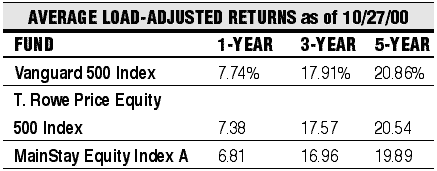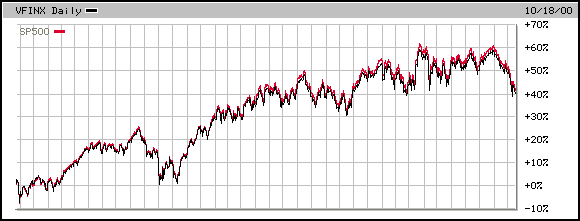
HOT TOPICS LIST
- Strategies
- Stocks
- Buy
- Investing
- Brokers
- Psychology
- Interviews
- Accumulate
- Sell
- Hold
- Spotlight
- Websites
- Candlestick Corner
- Gold & Metals
- Options Trading
LIST OF TOPICS
MUTUAL FUNDS
Index Funds
11/22/00 03:47:45 PM PSTby Sean Moore
What are they and why invest in them?
| Looking for a low-maintenance investment with substantial returns? Trying to decide how to allocate your money in your 401(k) or retirement account? One option is an index mutual fund. Although still as risky as their counterpart, the actively managed mutual fund, they offer some advantages that could make them a good choice for your portfolio. An index mutual fund matches the performance of a market or group of stocks and mirrors a specific stock market index. Index funds exist for a variety of markets, such as short-, intermediate-, and long-term bonds; US large-company and small-company stocks; value and growth stocks; international stocks; emerging market stocks; and so on. Some examples include the 30-year Treasury bond index and the 13-week T-bill index. One of the popular indexes followed by index mutual funds is the Standard & Poor's 500 index. When you invest in an index fund, you are investing in a basket of stocks, giving you the impression you are diversifying your portfolio. However, the S&P 500 index tracks the performance of 500 of the largest and most profitable companies in the US, so you are not really diversifying your portfolio among all stocks; you're only investing in large-growth US stocks. Index mutual funds follow other indexes as well, including the Nasdaq Index (technology stocks), the Russell 2000 Index (2,000 smaller-company stocks), the Wilshire 5000 Index (the entire stock market, around 9,000 stocks), and the Dow Jones Industrial Average (30 large-company stocks). Take a look at the performance of an index fund over the last 30-50 years. You will see that its performance will be similar to the performance of its benchmark index. When the index goes up, your fund will perform well, but if the markets are in a bearish mode, your fund will not. Index funds are passively managed, meaning the fund manager doesn't decide what stocks to buy and sell, but matches the makeup of the index followed. The holdings of an index mutual fund only change when the index it follows changes its holdings. For example, as of December 7, 1999, Yahoo! was added to the S&P 500, replacing Laidlaw, Inc. This change sent all the managers of funds associated with the S&P 500 scrambling to sell shares of Laidlaw and purchase Yahoo! shares for their portfolios. This differs from an actively managed mutual fund, where the fund manager buys and sells securities depending on their objectives and strategies. However, the performance of most actively managed funds is measured against a relevant index. It is a difficult task to outperform this benchmark, and the majority of funds are unable to do so. Therefore, index mutual funds become appealing investments. Indexfunds.com comments that "over the long term, the S&P 500 index has beaten about 65% to 80% of mutual funds, depending on the time period." In addition, Fool.com noted that approximately 80% of mutual funds underperform the stock market's returns in a typical year. ADVANTAGES There are certain advantages to index funds compared with other forms of financial instruments:
DISADVANTAGES There are some disadvantages to index funds as well:
PERFORMANCE Given the mutual fund options available, index funds should not be overlooked. Even within the index fund category, you have more than 160 choices. Before selecting an index fund, consider the expenses -- how closely the fund matches its index, the turnover rate, and load-adjusted returns.
To get an idea of how expenses affect returns, take a look at Figure 1. It compares three funds that follow the S&P 500 index. The Vanguard 500 Index (VFINX) incurs annual expenses of 0.18%. The T. Rowe Price Equity Index [PREIX] incurs annual expenses of 0.4% plus a 0.5% redemption fee. The MainStay Equity Index A [MCSEX] has an annual expense ratio of 0.94%, a front load of 3.0%, and 12b-1 fees of 0.25%. Not surprisingly, the Vanguard 500 Index comes out on top. Figure 2 shows the daily price chart comparison for the Vanguard 500 Index Fund and the S&P 500 for the last three years. As you can see, the two lines are nearly identical. The slight discrepancy can be attributed to low fund expenses.
Are index funds better or worse than actively managed funds? On one hand, they are passively managed and thus have lower fees and less turnover in the equities it holds. On the other hand, they carry risks and need to be scrutinized just as with any other investment. In the end, before investing in index funds, find out how much they cost, what their share turnover is, and how their performance compares against the index they follow. |
Traders.com Staff Writer.
| Title: | Project Engineer |
| Company: | Technical Analysis, Inc. |
| Address: | 4757 California Ave. SW |
| Seattle, WA 98116 | |
| Phone # for sales: | 206 938 0570 |
| Fax: | 206 938 1307 |
| Website: | www.traders.com |
| E-mail address: | smoore@traders.com |
Traders' Resource Links | |
| Charting the Stock Market: The Wyckoff Method -- Books | |
| Working-Money.com -- Online Trading Services | |
| Traders.com Advantage -- Online Trading Services | |
| Technical Analysis of Stocks & Commodities -- Publications and Newsletters | |
| Working Money, at Working-Money.com -- Publications and Newsletters | |
| Traders.com Advantage -- Publications and Newsletters | |
| Professional Traders Starter Kit -- Software | |
PRINT THIS ARTICLE

Request Information From Our Sponsors
- StockCharts.com, Inc.
- Candle Patterns
- Candlestick Charting Explained
- Intermarket Technical Analysis
- John Murphy on Chart Analysis
- John Murphy's Chart Pattern Recognition
- John Murphy's Market Message
- MurphyExplainsMarketAnalysis-Intermarket Analysis
- MurphyExplainsMarketAnalysis-Visual Analysis
- StockCharts.com
- Technical Analysis of the Financial Markets
- The Visual Investor
- VectorVest, Inc.
- Executive Premier Workshop
- One-Day Options Course
- OptionsPro
- Retirement Income Workshop
- Sure-Fire Trading Systems (VectorVest, Inc.)
- Trading as a Business Workshop
- VectorVest 7 EOD
- VectorVest 7 RealTime/IntraDay
- VectorVest AutoTester
- VectorVest Educational Services
- VectorVest OnLine
- VectorVest Options Analyzer
- VectorVest ProGraphics v6.0
- VectorVest ProTrader 7
- VectorVest RealTime Derby Tool
- VectorVest Simulator
- VectorVest Variator
- VectorVest Watchdog


